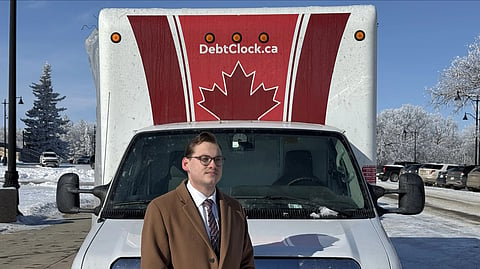

Canadian Taxpayers Federation (CTF) rolled its giant Debt Clock up to the Saskatchewan Legislature on Tuesday, urging Premier Scott Moe to balance the budget and reduce the provincial debt load.
The Debt Clock, mounted on the side of a truck, displayed the debt rising in real time, highlighting the serious financial challenge facing Saskatchewan taxpayers.
“Saskatchewanians balance their household budgets and they are only asking for the government to do the same,” said Gage Haubrich, Prairie Director of CTF.
“Taxpayers can’t afford to cover millions in interest payments every year because the government is failing to consistently balance the budget and pay down debt.”
The province’s debt is expected to reach $21 billion by the end of March, that’s an increase of $1.9 billion over last year.
According to Haubrich, interest charges on that debt will cost taxpayers about $728 million in 2025, which works out to $587 per person in Saskatchewan.
“With so much economic uncertainty, the government needs to give Saskatchewan a budget that doesn’t pile more debt onto taxpayers,” said Haubrich.
“It’s irresponsible to endlessly pile up debt and taxpayers can’t afford higher debt interest payments.”
The Western Standard asked Haubrich about what Moe’s strategy should be in the escalating trade war with the United States.
Haubrich’s advice centred on cutting spending to foster a more competitive environment for local businesses.
“Well, the biggest thing is that the government needs to make Saskatchewan businesses as competitive as possible,” said Haubrich.
“If the government is spending less money, that means there’s more revenue around that can be used for tax relief. For example, moving the small business tax rate to zero percent permanently.”
The CTF praised the government for temporarily reducing the small business tax rate during COVID, which helped companies stay afloat.
Haubrich said the same measure could offset the financial strain of the trade war.
“That would mean that Saskatchewan businesses would be that much more competitive,” said Haubrich.
“It would be easier to keep the lights on and preserve jobs for Saskatchewanians.”
